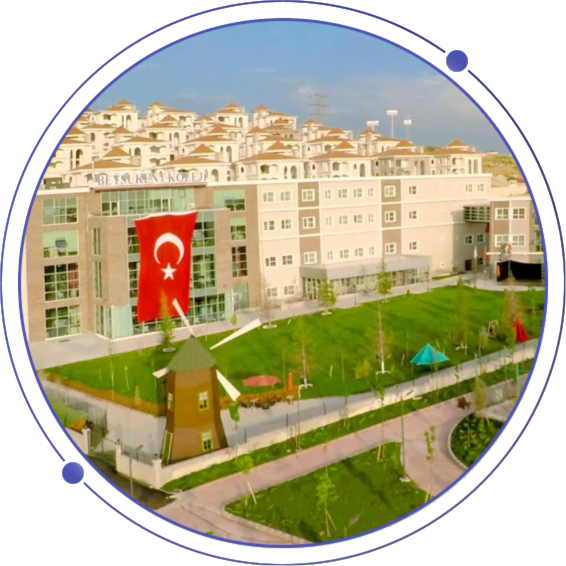
CIC at Kindergarten Level
In Beysukent kindergartens, which cover the ages of four, five and six, we carry out an English program of three hundred and sixty hours in the first two years and five hundred and forty hours in the sixth age group, together with our teachers, coordinators and academic advisors who are experts in language teaching in preschool.
The importance of exposure to the English language from an early age is emphasized in the applied linguistics literature. On the other hand, it is at least as important for this age group to acquire their mother tongue in accordance with their developmental level as teaching a second foreign language. Our children touch the world and their lives with their mother tongue, think, dream, express themselves and understand the people around them within the circle of their mother tongue skills. Throughout their educational life, their success in all branches from mathematics to science, from social sciences to art lessons is directly proportional to their ability to use their mother tongue.
At this point, CIC does not approach Beysukent families with rhetoric such as "English all day in kindergarten!", "English education with foreign teachers" or "We finish English in kindergarten!", which are far from scientific pedagogical foundations. Such approaches and ultimately practices may cause our children to develop language anxiety towards language learning, which is very difficult to compensate for and treat later on.
Therefore, what are we doing to teach English in our kindergartens?
- We create a natural language learning ecology that is meaningful for children through play and fun, accompanied by audio-visual materials appropriate to their developmental levels.
- We ensure that our children develop positive attitudes towards learning English and offer language activities to reinforce their self-efficacy so that they do not develop language learning anxiety.
- We expose our students to the language through Pre-A1 level English content and enjoyable tasks such as games, songs and fun activities, thus preparing them for their primary school years.
- By triggering a sense of achievement and curiosity at every moment, we ensure that our students develop intrinsic motivation towards language learning.
- Using concrete causality, object manipulation and physical activities, we teach the nature of language through actions that have visual, auditory and kinesthetic relevance in the child's life.
- We design our classroom activities taking into account each child's personality type, multiple intelligence profile and learning style.
- We use effective language teaching books, resources and materials that are internationally recognized for their pedagogical and linguistic quality.
CIC at Primary School Level CIC
Learning a foreign language at school that is not part of everyday life is a bit like growing an olive tree. From kindergarten onwards, our children receive dozens of hours of English language instruction, and as parents, we often worry that we may not see the tangible rewards of all this effort and labor in the early years.
Primary school is a time when our children are cognitively and emotionally fragile seedlings. As you know, "The tree is young," and all the investments made during this period will ensure that our child will grow and flourish like a well-established tree when the time is right.
Foreign language education throughout primary school at Beysukent Schools is based on this philosophy. Our children receive a total of 1,944 hours of face-to-face English lessons over the course of four years and, excluding intersessions and summer vacations, a total of 250 hours of out- of-class reading and language activities during the academic year alone.
By completing the A2+ level of the language qualifications set by the European Commission, they can demonstrate their communicative language skills as the following concrete competences:
Our students who complete primary school:
- Can understand frequently used idioms and expressions in daily life contexts, both orally and in writing;
- Can develop oral and written discourse in one-to-one information sharing and basic communicative tasks;
- Describe themselves and their environment in simple discourse in the face of sudden and unexpected contextual requirements.
In addition to these core outcomes, there are other, complementary competencies that we offer to students in Beysukent Schools' corporate approach to English language teaching and that we find vital as individual outcomes. These are:
- Our students develop self-efficacy and confidence in learning English. We call this "English as a Symbol of Success"; we strive to generalize the sense of success that our children develop while learning English to all areas of their lives and to become productive individuals who are peaceful and proactive in their behavior towards their environment and society.
- Beysukent Schools takes and implements all scientific measures to ensure that no child develops language anxiety and carefully monitors the outcomes of these practices. This is an issue that we pay close attention to. We take all scientific measures to ensure that none of our students live with foreign language anxiety at any stage of their lives.
- Beysukent English Language Education Coordinatorship enables each student to discover his/her individual learning rationale in the process of learning English. It turns language learning into an enjoyable part of the student's natural life.

